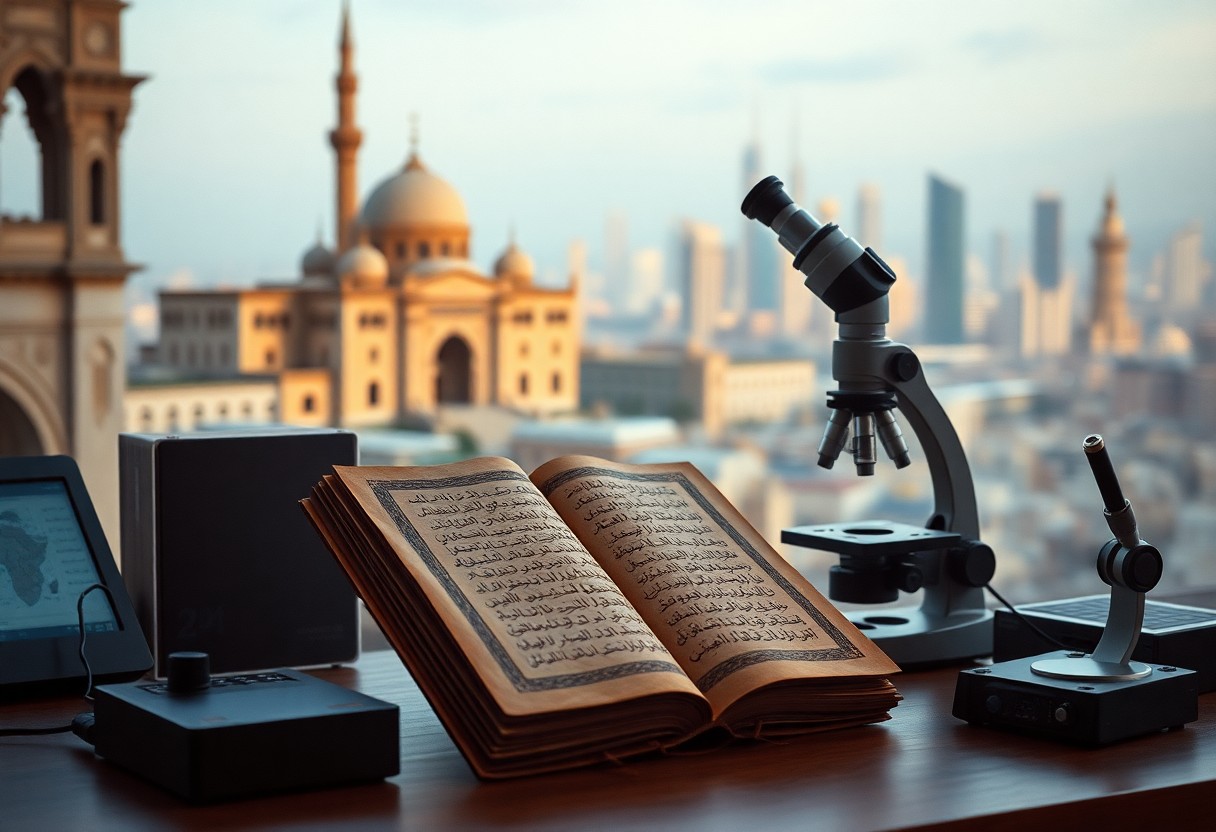It’s important for you to recognize the profound impact that the Arab world has had on scientific advancement throughout history. From the Golden Age of Islam where scholars made groundbreaking discoveries in mathematics, medicine, and astronomy, to the vibrant research landscape today, you will explore how these historic contributions shaped, and continue to influence, global science. As you investigate into the current initiatives and future potential in this region, you will gain insight into the challenges and opportunities that lie ahead for scientific innovation in the Arab world.
Early Scientific Achievements in the Arab World
While the Arab world has a rich history of scientific inquiry dating back to ancient times, early achievements included advancements in mathematics, astronomy, and medicine. This period laid the groundwork for a flourishing intellectual tradition, where scholars translated and preserved ancient texts, merging them with local knowledge. Your understanding of these early contributions will help you appreciate the enduring impact they had on the development of science globally.
The Golden Age of Islam
Among the most remarkable periods in scientific history is the Golden Age of Islam, which spanned from the 8th to the 14th century. During this time, scholars made significant strides in various fields, facilitating cultural exchanges that enriched knowledge across the globe. You will find that this era was characterized by the establishment of institutions such as hospitals and libraries, which fostered an environment for intellectual growth.
Key Figures and Their Contributions
On an individual level, key figures emerged who transformed the landscape of science through their innovative ideas and discoveries. You will discover how these scholars not only built upon their predecessors’ work but also introduced pioneering concepts that advanced human understanding of the natural world.
Consequently, figures like Al-Khwarizmi, who laid the foundation for algebra, and Ibn Sina (Avicenna), whose works in medicine became standard texts in Europe, represent the profound contributions of this era. Al-Farabi and Ibn al-Haytham also made notable strides in philosophy and optics, respectively, signifying a diverse landscape of thought and innovation. By engaging with their legacies, you can gain deeper insights into how their pioneering work shaped not only the Arab world but also global scientific discourse.
The Role of Ancient Arabic Texts in Modern Science
Some of the most significant contributions to modern science stem from ancient Arabic texts, which have greatly influenced various scientific disciplines. These texts not only preserved knowledge from earlier civilizations but also introduced innovative concepts, methods, and terminologies that are still relevant today. You can see how these works laid the foundational frameworks for disciplines such as mathematics, medicine, and chemistry, impacting the development of scientific thought in the West and beyond.
Translation Movements
Around the 8th to 10th centuries, a transformative translation movement occurred in the Arab world, fueled by the Abbasid Caliphate’s desire to expand knowledge. Scholars diligently translated Greek, Roman, and Indian texts, making them accessible in Arabic. As you explore this period, you’ll find how these translations not only preserved ancient wisdom but also sparked significant advancements in various fields, as they incorporated local innovations and interpretations.
Preservation of Knowledge
About the preservation of knowledge, ancient Arabic scholars played a vital role in safeguarding and expanding the scientific legacy of earlier civilizations. They meticulously transcribed and translated significant works, ensuring that valuable information did not perish over time. You can appreciate how their efforts created a vibrant intellectual environment, promoting collaboration and inquiry, which ultimately gave rise to major advancements in numerous fields.
For instance, during the precarious periods of cultural upheaval in Europe, it was the ancient Arabic texts that preserved a wealth of scientific knowledge. These scholars were dedicated to maintaining the integrity of works from various cultures, often enriching them with original insights. Their libraries became sanctuaries for texts that contained mathematical theories, medical practices, and philosophical inquiries. By doing so, they ensured that this important knowledge was not lost to history, and it ultimately paved the way for the Renaissance and the scientific revolution in Europe. You can see how this tradition of preservation was instrumental in shaping the future of science as we know it today.
Contributions to Mathematics and Astronomy
There’s a longstanding tradition of mathematical and astronomical advancements stemming from the Arab world. This period witnessed remarkable growth, with scholars not only preserving ancient knowledge but also significantly enhancing it. They laid the groundwork for future advancements, showcasing innovative techniques and theories that shaped the progression of science as a whole.
The Development of Algebra
For you to appreciate the true impact of Arab scholars, consider their substantial contributions to algebra. Pioneers like Al-Khwarizmi, often referred to as the “father of algebra,” developed systematic methods for solving equations, which not only transformed mathematical practices but also made these concepts accessible to a broader audience.
Innovations in Astronomy
Across the Arab world, astronomers were instrumental in advancing star mapping and developing observatories. Their skillful observations and precise calculations laid the groundwork for future astronomical explorations and innovations.
Indeed, the Arab world’s contributions to astronomy were nothing short of transformative. Notable astronomers such as Al-Battani and Al-Zarqali improved the accuracy of measurements, creating tables that charted celestial bodies. Their work included the refinement of the astrolabe and the development of mathematical models to predict planetary movements. This not only enhanced navigation but also influenced astrologers and astronomers from Europe and beyond, bridging East and West in a shared pursuit of knowledge. By understanding these innovations, you can grasp how the scientific world was irrevocably changed through the insights of these brilliant minds.
Medicine and the Arab World
Once again, the Arab world has played a significant role in shaping modern medicine. From ancient times, scholars in the region have made breakthroughs in understanding the human body and diseases, laying the groundwork for future advancements. Their contributions have influenced both Eastern and Western medical practices, paving the way for a rich legacy that perseveres today. As you explore this history, you will uncover a tapestry of knowledge that reflects the innovative spirit of the Arab medical community.
Pioneering Medical Practices
Medicine flourished in the Arab world with the establishment of hospitals and the introduction of advanced methods for diagnosis and treatment. These pioneering practices included the use of hospitals as organized facilities for patient care, which revolutionized how health was managed. Furthermore, Arab physicians emphasized clinical observation and experimentation, setting the stage for modern medical practices that value evidence-based approaches.
Notable Physicians and Their Works
Behind the achievements of Arab medicine are extraordinary physicians whose works and discoveries continue to resonate today. Their commitment to scholarship and inquiry has influenced medical knowledge across the globe, making their legacies invaluable.
Another standout contribution comes from renowned scholars like Avicenna, whose pivotal work, “The Canon of Medicine,” structured medical knowledge systematically. His writings encompass pharmacology, anatomy, and pathology, and their impact spans centuries, influencing both Eastern and Western thought. Additionally, Al-Razi, known for his focus on clinical observation, advanced the understanding of diseases such as smallpox and measles. These notable figures shaped the foundation of modern medicine, and their meticulous research and insights formed a bridge between ancient practices and contemporary medical science.
The Impact of Colonialism on Arab Science
Keep in mind that colonialism had a profound effect on Arab science in the golden age (750–1258 C.E.) and today. It disrupted established scientific practices, redirected funding towards colonial interests, and often sidelined indigenous knowledge. This shift caused a regression in research and innovation, stifling the growth of scientific communities that once thrived throughout the Arab world.
Challenges and Changes
Against this backdrop, the scientific landscape faced numerous challenges, including loss of autonomy and diminished access to resources. Educational institutions were often restructured to serve colonial purposes, leading to a generational gap in scientific knowledge and expertise. These changes weakened local capacities and impinged on the natural progression of science in the region.
Response of the Scientific Community
Changes in the scientific community emerged as a response to these colonial influences. Scholars and researchers sought to reclaim their identity and heritage, often blending traditional knowledge with contemporary scientific practices. They advocated for the restoration of educational structures and pushed for the revitalization of scientific inquiry within their communities.
For instance, many Arab scientists began to focus on creating networks that fostered collaboration and innovation, aiming to revive critical scientific disciplines. This movement often emphasized the importance of drawing from historical achievements while integrating modern methodologies. The efforts resulted in a resurgence of interest in STEM fields among the youth, highlighting the determination of the scientific community to overcome obstacles and redefine their legacy.
Current Scientific Landscape in Arab Countries
Unlike past centuries when the Arab world was a beacon of scientific achievement, the present scientific landscape is a mix of growth and challenges. While funding for research and development is improving in nations like the UAE and Saudi Arabia, disparities exist between regions. Many institutions are working to enhance their global impact, and exciting developments in fields such as renewable energy, biotechnology, and information technology are emerging. You can observe a rising commitment to addressing pressing regional issues, aiming to redefine the Arab scientific identity on a global stage.
Research Institutions and Initiatives
Before plunging into individual research projects, it’s imperative to recognize the establishment of various innovative research institutions in Arab countries. Initiatives led by governments and private sectors aim to foster creativity and collaboration, ensuring researchers have access to advanced facilities and funding. You will find institutions focusing on several disciplines, encouraging interdisciplinary studies that address local and international challenges.
Collaboration with Global Scientific Community
Countries in the Arab world are increasingly prioritizing collaboration with the global scientific community. You should note that partnerships with international universities and research organizations facilitate knowledge exchange and promote joint projects that advance scientific understanding.
The collaboration enhances your ability to engage with leading experts from around the world, enabling you to contribute to groundbreaking research. By pooling resources and sharing best practices, countries in the Arab world can address urgent challenges like climate change, public health, and sustainable development. This collaboration is a testament to the growing recognition of the Arab world’s potential in scientific innovation and positions you to be part of a global conversation that fosters impactful solutions. Moreover, it opens avenues for funding and increased visibility for your research initiatives, ultimately elevating the scientific standing of the region.
Future Prospects and Opportunities
Despite the challenges faced, the Arab world stands at the cusp of a scientific renaissance. Investment in research, education, and technological advancement can pave the way for groundbreaking discoveries. Collaborative efforts between educational institutions and industries foster an environment ripe for innovation. By focusing on sustainable development goals and enhancing research policies, you can play a significant role in harnessing the potential of the Arab scientific community to address pressing global issues.
Emerging Fields of Research
Fields like renewable energy, biotechnology, and artificial intelligence are rapidly evolving in the Arab world. These sectors present exciting opportunities that can harness local talent and resources while addressing both local and global challenges. Focusing on these fields can place you at the forefront of critical advancements that benefit society as a whole.
Encouraging Scientific Innovation
Beside identifying emerging fields, promoting a culture of scientific inquiry is crucial for the future of innovation. Encouraging collaboration among universities, researchers, and industries not only fosters creativity but also generates an ecosystem that nurtures groundbreaking ideas.
Innovation plays a significant role in driving progress within the Arab scientific community. By prioritizing interdisciplinary collaborations and investing in research infrastructure, you can cultivate a vibrant atmosphere that encourages sharing ideas and resources. Highlighting the importance of available funding, mentorship programs, and support for start-ups can lead to a landscape where innovation thrives. Your engagement in promoting science literacy within the society can also unlock new pathways for individuals to contribute positively to the scientific landscape.
Conclusion
With this in mind, you can appreciate the rich tapestry of scientific contributions from the Arab world that have shaped modern knowledge and innovation. The historical achievements, from mathematics to medicine, have laid a foundation that continues to influence your scientific endeavors. Looking ahead, the potential for the Arab world’s contributions is immense, as ongoing investment in education and research can foster a new generation of thinkers and innovators. Embracing this legacy can empower you to participate in a global dialogue, further bridging the past and future of science.
FAQ
Q: What are some notable scientific contributions from the Arab world during the Golden Age of Islam?
A: The Golden Age of Islam, spanning from the 8th to the 14th centuries, was a remarkable period for scientific advancement in the Arab world. Scholars such as Al-Khwarizmi made significant contributions to mathematics, particularly in algebra, which derives its name from his work “Al-Kitab al-Mukhtasar fi Hisab al-Jabr wal-Muqabala.” Additionally, Ibn al-Haytham is often referred to as the ‘father of optics’ for his pioneering studies on light and vision outlined in “Book of Optics.” Furthermore, Avicenna (Ibn Sina) was instrumental in numerous fields, including medicine, where his text “The Canon of Medicine” became a standard medical reference for centuries. These contributions laid the groundwork for future scientific inquiry and education in various disciplines.
Q: How has the perception of science changed in the Arab world in contemporary times?
A: In recent years, there has been a growing emphasis on revitalizing scientific research and education in the Arab world. Countries are increasingly investing in higher education and research institutions to foster innovation and technological development. Initiatives such as the Arab Strategy for Scientific Research and Technological Development aim to enhance collaboration among Arab states and promote a culture of scientific inquiry. However, challenges remain due to political, social, and economic factors that can impact the scientific landscape. The perception of science is gradually shifting towards recognizing its importance for sustainable development and the region’s global competitiveness.
Q: What role do Arab countries play in the future of global scientific research?
A: Arab countries are positioned to play an integral role in the future of global scientific research due to their strategic investments in education and technology. Organizations like the Arab Science and Technology Foundation are facilitating collaborations across borders to address common challenges, such as climate change and public health. The focus on creating research hubs, obtaining patents, and encouraging innovation aligns with global scientific endeavors. Additionally, there is a burgeoning emphasis on fostering young scientists through initiatives and grants, which will fuel future contributions to international research. The potential for collaboration, especially with a focus on emerging fields like renewable energy and biotechnology, indicates that the Arab world could significantly influence worldwide scientific progress.











